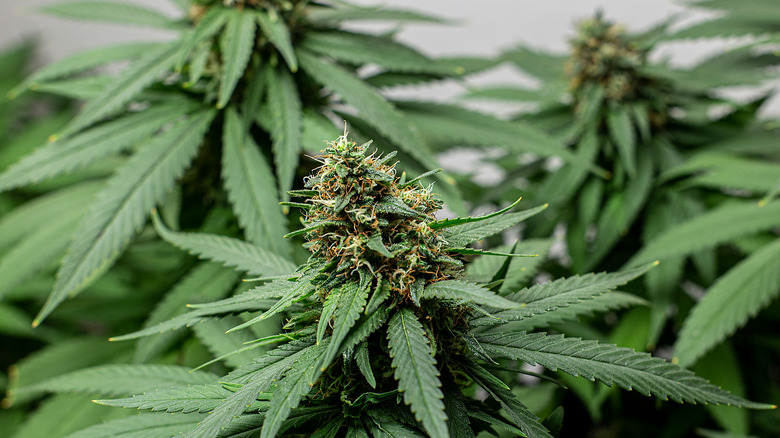Are You More Likely To Get Lung Disease From Tobacco Or Cannabis?
Experts have long known that smoking tobacco increases the risks of many health conditions including heart disease and lung cancer. It also contributes to lung diseases such as chronic bronchitis and emphysema (via Johns Hopkins Medicine).
But little is known about how cannabis affects the lungs. Researchers from Canada decided to investigate the matter by examining the CT scans of people who smoke tobacco and cannabis. The 2022 study, published in the journal Radiology, looked at the scans of 56 marijuana smokers, 33 tobacco-only smokers, and 57 non-smoking individuals, who were used as controls. The study lasted from October 2005 to July 2020. The study found that cannabis smokers had "higher rates of airway changes" than those who smoked only tobacco and nonsmokers. Emphysema was the disease most common in cannabis smokers. Specifically, 75% of cannabis smokers developed emphysema, while 67% of tobacco smokers and 5% of nonsmokers developed the disease.
Smoking cannabis appears to do more overall damage than tobacco
According to the study, in addition to higher rates of emphysema, one analysis showed that 64% of cannabis smokers experienced bronchial wall thickening compared to 42% of tobacco smokers. In addition, 32% of cannabis smokers developed bronchiectasis, while 6% of tobacco smokers did. Similarly, more cannabis users (46%) had more mucoid impaction than tobacco users (15%). Researchers noted that the average amount of cannabis used daily was varied, with 28 out of 56 participants smoking an average of 1.85 grams per day. In addition, 50 out of the 56 cannabis smokers also smoked tobacco.
"Our findings suggest that smoking marijuana leads to chronic bronchitis in addition to the airway changes associated with smoking tobacco," said the authors of the study. They stated that the results were "striking" given the extensive smoking history of tobacco-only smokers, which amounted to 25 to 100 pack-years, and the younger cannabis smokers who had presumably been exposed to less cigarette smoke in their lifetimes. The authors of the study acknowledged that their findings were limited due to the small sample size and the variable measurement of cannabis use, and said that more research was needed. That said, the Centers for Disease Control and Prevention (CDC) explains that regardless of how cannabis is smoked, it can also damage blood vessels and cause scarring.


